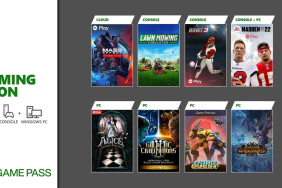Last week, I explored one of the less-discussed aspects of personal identity that fails to be properly explored in most games. Now, moving on from family, I’d like to focus on another: religion. Although religion might be too touchy a subject, the fact is that games, especially nowadays, rarely stray from making some kind of social commentary, whether it is noteworthy or lazy in its execution. I’d like to believe that games could portray religion more often and in more engaging ways than we’re used to.
No, God of War doesn’t count.
Although many games leave religion out, there are religious concepts and icons that creep into narratives, which don’t really contribute to this discussion of identity. First and foremost is the messiah trope where the lead protagonist will or is destined to save the world/universe. Although the messiah or figures have a basis in religion, their implementation is largely neutral. The Lone Wanderer in Fallout 3, Desmond from Assassin’s Creed, and the leads in Persona games fulfill their duties well in preventing total destruction or ushering in new ages of humanity, but players are not likely to find blatant spiritual connections to their tales. The naming of the lead in Mass Effect as Shepard, though noted, also doesn’t count.
Then there are games which feature religions, both dead and alive, in their narratives. God of War’s Greek mythological origins don’t enhance its spiritual qualities, and Bayonetta’s representation of witches is not the validation Wiccans have been seeking for centuries. Some games feature churches and religious figures, such as the Dragon Quest series, but Judeo-Christian norms are more ever-present than they are sanctifying.
On the positive side, some games do portray some kind of spirituality well. Mass Effect 2 did offer the Drell religion, blessing Shepard so nobly that some have used it at funerals in real life. The dwarves of Dragon Age have a nigh beautiful faith built around The Stone, resembling the idea of a lone creator. And Okami is all about respecting your Japanese gods and spirits, even allowing the player to control the goddess of the sun, Amaterasu.
The problem is that these games can get away with this kind of religious portrayal because the religions either don’t or no longer exist (apart from Shintoism). There is no controversy to be had as long as the good religion is not currently recognized. Thus, unless you believe in dead or fictional religions yourself (and I’m open to the idea that some do), you’re not going to see yourself in these narratives.
We get it. Hypocrisy blah blah.
The first challenge games need to surmount to better represent religious identity is to stop relying on lazy anti-religious story arcs. I sometimes feel like writers think they’re being clever when they poke fun at the Christian religions or the Catholic church, but it’s been done to death. Both Final Fantasy X and Grandia II have twists where the dominant religion not only turns out to be run by corrupt people, but also is made fallible by some secret plot twist revealed later on.

Assassin’s Creed has you trying to murder the pope! Heaven is basically evil in Bayonetta. The Chantry in Dragon Age resembles the Crusades-age Christianity of our own history. Red Dead Redemption only uses Christian rhetoric in juxtaposition to the racist treatment of Native Americans. And last year’s winner, Bioshock Infinite, takes that idea further, mimicking early 20th century Christian-based society in America solely in order to associate it with the prevalent racism and xenophobia of the time.
We get it! There were and definitely are Christians who don’t act so Christian. However, to make it seem like that is the only idea about Christianity to be had is just cliché by now. Even as a Jewish-raised atheist, I can recognize these sorts of narratives as tired. Also, making video games atheistic and antagonizing major world religions are examples of avoiding a real discussion about the breadth of gamers’ identities.
Looking away from Sinai.
An obvious challenge when it comes to representing more religious identities in gaming is how a section of the market may respond to games featuring religions they don’t follow. However, I’m not talking about doing a Bible Adventures for every major religion. Besides, if you did want to go that route, El Shaddai: Ascension of the Metatron is a fantastic standard to work from.
Instead, like any other identity under-representation issue in gaming, I’m saying it’s OK if characters in games wear a cross, have Hindu decorations in their apartments, or even pray to Allah as they jump out of an exploding helicopter [Maybe the next Call of Duty hero? ~Ed. Daniel Bischoff]. Religion exists, and neutering characters of that fact does a disservice to the player base.
After all, all gamers are not white, godless men, my own self notwithstanding. I do not feel closer to or better represented by a game that pokes fun at Christians. Actually, because atheism means not believing in any god, when a character does not demonstrate any religious expression, I can’t assume he or she is like me any better than a gamer who identifies as Buddhist can.

So reaffirming that there are some games that handle world religions gracefully, here are some good examples of where it works:
- El Shaddai presents an apocryphal Biblical story that makes for an entertaining and surreal adventure, showcasing the benefits and pitfalls of God-granted free will.
- Fallout 3’s main narrative is tied to a passage from Revelations, which ultimately becomes fundamental to saving the wasteland.
- Asura’s Wrath incorporates Hindu and Buddhist themes and stories into a fun, engaging science-fiction narrative.
- The Shivah is a point-and-click adventure about a rabbi trying to amass a congregation for his synagogue and ends up tied to a plot of intrigue regarding a recently acquired inheritance.
- Games from the Shin Megami Tensei line feature creatures and spirits derived from practically every religion ever, and characters in the Persona series follow many Buddhist traditions.
Games like these don’t push a religious doctrine, but they do fairly represent multiple religions. Identities and stories are adapted into narratives where religion does exist, but is not the focus. In some, the religion could easily be swapped for any other, which is key to doing this right.
I’m also inspired to mention this blog from Fullbright Company’s Steve Gaynor: On Pointlessness. Here, he discusses the idea of creating religious havens players could use with no gameplay-related reward present for doing so. In an open-world game, particularly one that mimics or presents a real-world city, developers could add in churches, temples, mosques, and the like that players could explore and identify with. Whether this is advisable for games that allow building destruction or NPC killing really depends on the implementation, but as I said, avoiding these problems doesn’t solve anything. (GTA still lets you kill hookers after you have sex with them, so clearly Rockstar is not averse to controversy.)
Not to sound like a broken record, but I think it’s important for developers to represent more aspects of our identities. The world is made up of varying races, religions, cultures, body sizes, gender expressions, and sexual orientations, and any effort to represent those can be positive, so long as developers don’t always fall back on played-out stereotypes. Media in general paints a very one-note picture of humanity that is so far from the truth that it is basically fantasy.











